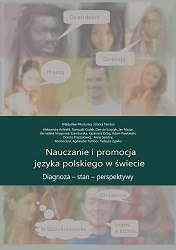Nauczanie i promocja języka polskiego w świecie. Diagnoza – stan – perspektywy
The teaching and the promotion of the Polish language in the world. Assessment – status – perspective
Author(s): Władysław Miodunka, Jolanta Tambor, Aleksandra Achtelik, Romuald Cudak, Danuta Krzyżyk, Jan Mazur, Bernadeta Niesporek-Szamburska, Kazimierz Ożóg, Adam Pawłowski, Dorota Praszałowicz, Anna Seretny, Roman Szul, Agnieszka Tambor, Tadeusz Zgółka, Małgorzata Smereczniak, Karolina Graboń
Subject(s): Anthropology, Social Sciences, Language studies, Language and Literature Studies, Education, Fine Arts / Performing Arts, Foreign languages learning, Studies of Literature, Polish Literature, Western Slavic Languages, Culture and social structure , Film / Cinema / Cinematography
Published by: Wydawnictwo Uniwersytetu Śląskiego
Keywords: education; teaching Polish; Polish as foreign; mother tongue; foreign language; second language; heritage language; Polish literature; Polish culture; Polish cinema; promotion; certification
Summary/Abstract: “The teaching and the promotion of the Polish language in the world. Assessment – status – perspectives” is an indispensable item in the library of teachers, lecturers, instructors, Polonia activists, promoters of cultural activities, journalists and diplomats – to put it briefly, all people who are concerned about the prestige, the fate and the status of the Polish language in the world and all people upon whom the fate and the status of the Polish language depends. The publication was developed by the following team of authors: Władysław Miodunka, Jolanta Tambor, Aleksandra Achtelik, Romuald Cudak, Danuta Krzyżyk, Jan Mazur, Bernadeta Niesporek-Szamburska, Kazimierz Ożóg, Adam Pawłowski, Dorota Praszałowicz, Anna Seretny, Roman Szul, Agnieszka Tambor, Tadeusz Zgółka (collaborators: Małgorzata Smereczniak, Karolina Graboń). The authors at the same time constitute a team of experts appointed by His Magnificence Rector of the University of Silesia on the basis of an agreement with the Ministry of Science and Higher Education in January 2017 in order to develop a strategy of the teaching and the promotion of the Polish language in the world which was supposed to involve the following items:• the teaching of the Polish language as a foreign language in all age groups, at all levels, both in the system of non-higher education and higher education and in all forms;• the promotion of the Polish language in the world, along with an indication of the priority geographical areas and the areas of substance, as well as the instruments of promotion;• the coordination of the activities and the establishment of the tasks of the particular institutions;• the indication of the scope of the necessary legislative modifications and the means of financing.The work on the strategy was completed in July 2017, the book is going to be released in July 2018. The chronological distance is slight but it is quite eventful. Above all in October 2017 one established the National Agency of Academic Exchange, an institution which took over the tasks of the Bureau for Academic Recognition and International Exchange, but also of a number of other sections, divisions and departments. Before the publication of the work the authors attempted to introduce the necessary changes, which take into account the new situation. However, this was not always possible.The authors assess the current status of the teaching and the promotion of the Polish language in the world and they put forward the best solutions to solve the problems, they suggest the best solutions possible. We realise that prompt realisation of some of the changes which are proposed is not possible, for it would require huge system-related modifications – however, these are maximum plans, which indicate the ills of the current state of affairs and the things which are relevant to teachers, students, parents of children of Polish origin and foreigners who learn Polish for a variety of reasons (e.g. migrants, refugees, as well as re-emigrants, who enter the Polish system of education), things which are also relevant to the enthusiasts of Polish literature, Polish theatre, Polish cinema, to people who stay abroad where access to the products of culture is sometimes considerably limited; to Polish tourists, travellers, passengers who are hard put to receive Polish announcements in airplanes, Polish-language customer service in trains or Polish notices in such airports. Fragments of this publication will be useful for students who major in foreign language pedagogy, for post-graduate students who train to become teachers of the Polish language as a foreign language. The work should be consulted by teachers, lecturers as well as students. Inspiration from this work ought to be drawn by people who are responsible to introduce certain changes, to make certain decisions and introduce some solutions which are put forward.The work describes the status at the turn of 2018 – the status which remains the same system-wise. It furnishes a basis for re-thinking, it indicates the things that may be fixed quickly and easily, and the things which require a greater deal of effort. We would like to indicate clearly – and this is very important – that the work also presents all of the accomplishments, triumphs and the strong points of Polish-as-a-foreign-language education and the promotion of Poland and the Polish language.
Series: Pedagogika, Dydaktyka
- E-ISBN-13: 978-83-226-3535-3
- Print-ISBN-13: 978-83-226-3534-6
- Page Count: 340
- Publication Year: 2018
- Language: Polish
- eBook-PDF
- Table of Content
- Introduction

